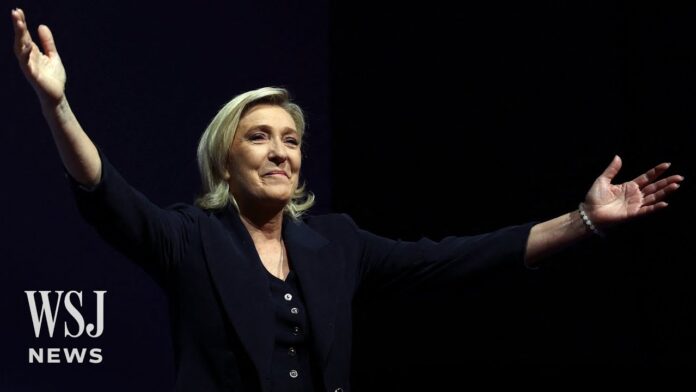Marine Le Pen’s national rally takes the lead in the high-stakes election, signalling potential political upheaval
Marine Le Pen’s far-right National Rally (RN) party has surged ahead in the first round of France’s parliamentary elections on Sunday, initial projections showed, marking a historic shift in French politics. The RN leads with 34% of the vote, while the left-wing New Popular Front (NFP) coalition is in second with 28.1%, and President Emmanuel Macron’s Ensemble alliance has slumped to a disappointing third with 20.3%, according to estimates by Ipsos.
Despite leading the polls, the RN may fall short of the 289 seats required for an absolute majority in the National Assembly. Projections suggest that the RN could secure between 230 and 280 seats in the 577-seat lower house, a significant increase from its current 88 seats. The NFP is projected to win between 125 and 165 seats, and Ensemble is expected to secure between 70 and 100 seats.
Macron called for the snap election after his party’s defeat in the European Parliament elections earlier this month. The results indicate that Macron may face the remainder of his presidential term in a challenging cohabitation with a prime minister from an opposition party.
At the RN election party in Henin Beaumont, Marine Le Pen celebrated the results but emphasized the importance of the second round of voting next Sunday. “Democracy has spoken, and the French people have placed the National Rally and its allies in the first place – and has practically erased the Macronist bloc,” Le Pen told supporters.
Anti-far-right protests erupted in Paris following the announcement of the results, with demonstrators lighting fires and setting off fireworks. Videos showed clashes between protesters and police, including the use of tear gas.
The second round of voting will be critical, as centrist and left-wing parties decide whether to unite to block the RN from gaining a majority, following the principle of the “cordon sanitaire.” This tactic has been used in the past to prevent the far-right from taking office.
In a rare move, Macron called the snap election three years early, a gamble that has now left him in a precarious position. The outcome of the second round could determine the future of France’s domestic and foreign policies, with potential implications for the country’s stance on issues like the Ukraine conflict and economic reforms.
Analysis:
Political Perspective:
The RN’s lead signals a significant shift in French politics, potentially altering the legislative landscape and challenging Macron’s presidency. The prospect of a hung parliament or cohabitation raises questions about the future direction of France’s domestic and foreign policies.
Social Perspective:
The election results highlight deep divisions within French society, with significant support for far-right, anti-immigrant, and eurosceptic policies. The protests in Paris reflect broader societal tensions and the polarized political climate.
Economic Perspective:
The RN’s economic policies, including tax cuts and increased public spending, could exacerbate France’s budget deficit, potentially leading to a financial crisis. The outcome of the election could significantly impact France’s economic stability and its relationship with the European Union.
Historical Perspective:
The rise of the RN marks a historic moment in French politics, reminiscent of past far-right surges. The election’s outcome could redefine the political landscape, similar to previous pivotal moments in France’s Fifth Republic.
